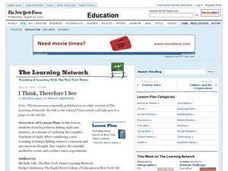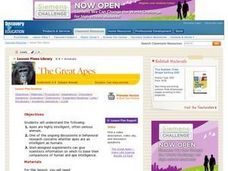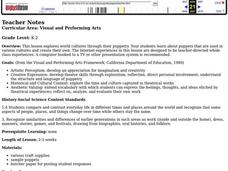Curated OER
Gravity: What is it?
What is gravity and how do you explain it? Use this presentation to guide an inquiry-based lesson centered on understanding gravity through hands-on experience. Each slide provides a definition, example, or activity for students to...
The New York Times
Crossing the Line Online: Sexual Harassment and Violence in the Age of Social Media - NYTimes.com
Sexual harassment and sexual violence are by no means new issues. What has changed is the role of social media in these issues. This powerful and troubling lesson uses a specific rape case to launch research into a discussion of the...
American Chemical Society
Exploring Moisture on the Outside of a Cold Cup
As a stand-alone or as part of the intended unit, this is a valid investigation of what causes condensation to occur. By limiting the amount of air around a cold cup of water and comparing it to one out in the open, they find that the...
Tennessee Technical University
Carousel Brainstorm
A variation of the Walkabout Review process, carousel brainstorming directs groups to rotate through a series of stations posting ideas on the topic or question posted at each stop.
K12 Reader
If
Rudyard Kipling's advice to his son in the poem "If" is a resounding message that echoes through generations. After reading the famous poem, middle schoolers work on analyzing specific lines, completing activities based on unfamiliar...
Walt Disney Company
Disaster Preparedness Activity Book
Join the American Red Cross as well as Mickey and friends as they help to prepare young scholars for natural disasters. After reading brief informational passages about earthquakes, floods, fires, storms, tornadoes, and hurricanes,...
Roy Rosenzweig Center for History and New Media
Continental Differences
Middle schoolers break into groups and closely investigate primary sources associated with the seven different continents. After deciding which continent their primary sources relate to, representatives from each group present their...
Curated OER
Begging for Another Chance
Students read a New York Times article in order to explore different perspectives on homelessness. They volunteer at sites that help the homeless and share their experiences.
Curated OER
Gandhi's Life and Guiding Principles
Second graders investigate philosophy by researching the life of Mahatma Gandhi. In this biographical lesson, 2nd graders listen to a reading of the book "Gandhi" and make a character map of his actions, feelings and thoughts. Students...
Curated OER
What is Science?
Students explore physical science by conducting a plant experiment. In this scientific method lesson, students discuss questions scientists ask in order to properly explore certain subjects. Students utilize two plants and place one in...
Curated OER
Why Isn't It 50-50
Young scholars comprehend the difference between the outcome of the experiment and the outcome that they expected. They analyze outcome of probability experiment and compare theoretic and empirical results. Pupils discuss the difference...
Curated OER
I Think, Therefore I See
Students participate in a memory experiment to discover how the eye works. After reading an article, they analyze a new technique which examines how the brain registers sight. They develop their own memory game and conduct trials using...
Curated OER
Fighting the War in Your Head
Students analyze the experiences of a fictional soldier in a war and create a mental health profile for that individual. They emulate psychiatrists and propose treatment strategies for their particular soldier's post-traumatic stress...
Curated OER
In Their Own Words
Students watch a video of people telling about their experiences with a mental illness. They compare and contrast the life stories they saw to reinforce how mental illnesses are biological illnesses that affect a person's thoughts,...
Curated OER
Dream Catchers
Fourth graders, after researching legends and the origin of Native American beliefs and thoughts about the use and importance of dream catchers in Native American cultures, create a Native American dream catcher. They use similar...
Curated OER
Student Internship Program
Students research and identify their own internship opportunities. They keep a daily journal describing their experiences during their 30 hour volunteer internship programs
Curated OER
The Great Apes
Students prepare experiment plans for a peer review session to test the intelligence level of gorillas. They view and discuss a Discovery Channel video on the wild behaviors of gorillas then create three experiments that could test the...
Curated OER
Dangerous Earth
Middle schoolers view a Dangerous Earth video and research a historic or recent earthquake. In this earthquake lesson students create a piece of are to portray the experience of their particular earthquake.
Curated OER
Exploring Heroism
Students examine the concept of heroism in this lesson, through personal reflection, group activities and a thoughtful analysis of the documentary, HEROES OF GROUND ZERO. They explore their own understanding of what it means to be a hero.
Curated OER
Seeking Refuge, in Words And Pictures
Students explore first-hand accounts and pictures of refugees, focusing initially on child refugees in Chechnya. They then create collages that describe, through words and images, the experience of refugees in countries at war.
Curated OER
No Regrets: a Poetry Analysis
Young scholars read a poem and use the TPCASTT strategy for analysis. In this poetry analysis lesson, students journal about their future goals and read John Updike's "Ex-Basketball Player." Young scholars discuss the purpose of the poem...
Curated OER
Making a Memoir Lesson Memorable
Memoir lessons can give students a format for writing about their experiences, and a way to tap into their inner author.
Curated OER
PUPPETRY
Students explore world cultures through their puppetry. Your students explore puppets that are used in various cultures and create their own. The Internet experiences in this instructional activity are designed to be teacher-directed...
Curated OER
Four Immigrant Groups: Their Lives and Music
Fourth graders examine the experiences of four immigrant groups. Class members brainstorm a list of misconceptions of those groups and discuss if these perceptions are still present today. Using maps, groups locate the countries of...

























